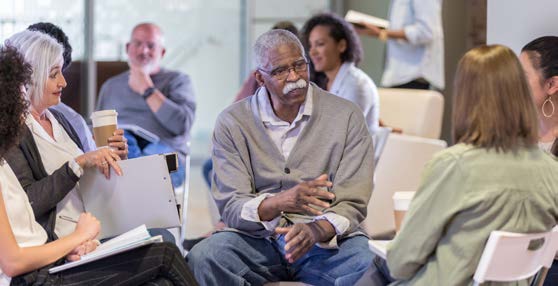About
This fact sheet is for community leaders. It offers tips for supporting members experiencing stress from environmental contamination. It explains the stress caused by contamination and provides guidance on how organizations can help mitigate it.

You can help patients manage stress
If your community's air, water, or soil is contaminated (for example, because of chemicals from a nearby factory), the people you serve may be facing tough questions:
- Could chemicals in my community be causing health problems?
- How can I protect myself and my family?
- Where can I get reliable information about what's happening?
During uncertain times, it's normal for people to feel stressed or even overwhelmed. And because environmental contamination concerns can take months or years to address, stress may become an ongoing issue for residents who are affected.
You have an important role to play — and a chance to make this difficult situation a little easier for your community. While you may not be able to change what's happened, you can validate residents' experiences, offer support, and help them manage stress
Acknowledge frustrations
Residents may lose trust in the government and local organizations. So, show them that you’re listening and that you take their health and safety concerns seriously. Acknowledge that dealing with so much uncertainty is hard, and you don’t have all the answers, but you’re here to help.
Share updates online, in print, and in person.
Help distribute reliable information about the issue. Communicating in different ways can help you reach more people. They may get their information from websites, social media, or the community center bulletin board.
Recognize community expertise.
Another way of listening is to seek out and acknowledge community members who are leaders on these issues. These residents can provide invaluable experience and firsthand knowledge of your community's needs.
Share resources wisely.
When community members ask for more information about local environmental issues, point them toward reliable resources. These would be environmental and health agencies and other organizations that include specific, realistic action steps. If they mention feeling stressed or overwhelmed, consider sharing resources about stress from environmental contamination — like our Stress Fact Sheet. You'll find it and other resources in our ATSDR Community Stress Resource Center.
If you choose to share resources about stress, be sure to distribute them along with resources about the specific contaminants. Be sure to include resources that address related health risks that are affecting the community. It's best to share stress-focused materials during individual or small group conversations.
Help community members connect, learn, and organize.
You can provide a forum for community members to
- connect,
- share the latest updates,
- learn about the contamination and ways to stay safe, and
- make their voices heard.
Some groups may meet in person, while others may use social media to stay connected.
Take care of yourself.
Addressing community members’ concerns can take a toll. If you live in the same community, you may have similar worries about your own health and safety. When you’re focused on helping community members, it’s easy to overlook your own needs. Be sure to practice self-care by:
- Getting plenty of sleep
- Staying physically active
- Practicing mindfulness —for example, meditating or journaling
- Making time for other activities that you enjoy
And if you find yourself struggling with stress, reach out to your health care provider for help.
Why stress matters
Stress is a natural response to new, uncertain, or threatening situations, but too much stress can interfere with everyday life. Chronic stress can also raise the risk of health problems like heart disease and high blood pressure.
So when you're working with communities affected by environmental concerns, keep stress in mind. Be ready to provide support and resources to residents.
Learn more with ATSDR's Community Stress Resource Center at www.atsdr.cdc.gov/stress.
Questions?
Contact ATSDR at ATSDRstress@cdc.gov.
Download this page as a PDF. Spanish version available.

